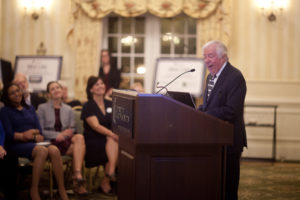 The 17th season of the William B. Crawley Great Lives Lecture Series continues on Tuesday, Feb. 18, with a look at the brilliant and enigmatic scientist and disability icon Stephen Hawking, with biographer Kitty Ferguson. This series is open to the public free of charge and no admission tickets are required. Programs begin at 7:30 p.m. in Dodd Auditorium in George Washington Hall. Each lecture concludes with an audience Q&A session with the speaker and a book-signing. The Dovetail Cultural Resources Group Lecture.
The 17th season of the William B. Crawley Great Lives Lecture Series continues on Tuesday, Feb. 18, with a look at the brilliant and enigmatic scientist and disability icon Stephen Hawking, with biographer Kitty Ferguson. This series is open to the public free of charge and no admission tickets are required. Programs begin at 7:30 p.m. in Dodd Auditorium in George Washington Hall. Each lecture concludes with an audience Q&A session with the speaker and a book-signing. The Dovetail Cultural Resources Group Lecture.
“It’s been a remarkable journey.” With those words Kitty Ferguson describes her thirty years knowing and writing about Stephen Hawking. When she first met him in 1989, he had recently published his A Brief History of Time. He was also already trapped silent in a wheelchair, able to shift just one or two fingers to operate his communications system, tediously, word by word. The inexorable progress of Motor Neuron Disease had begun more than twenty-five years earlier when he was a first-year graduate student in the University of Cambridge.
Hawking’s legacy consists of more than stunning ideas, scientific advances and theories. His adventurous spirit ensnared a generation of younger scientists. He gave a priceless gift of inspiration to disabled people and others of us who have had to adjust our attitudes about disability.
Who was this man? This scientist who so often changed his mind and undermined his own previous discoveries . . . who bequeathed to his field questions others will spend decades answering . . . who took readers and lecture audiences laughing into black holes and to the origin of the universe . . . who toughed it out against odds that would have destroyed almost anyone else?
Stephen Hawking relished his work and life in a manner totally his own, an enigma even to those who knew him best. In spite of the difficulties, his was a life well lived.
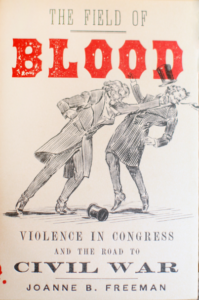 The Great Lives series will continue on Thursday, Feb. 20, with American Duelists, presented by author Joanne Freeman. The Hirschler Lecture.
The Great Lives series will continue on Thursday, Feb. 20, with American Duelists, presented by author Joanne Freeman. The Hirschler Lecture.
Professor Freeman’s lecture is based on her acclaimed 2018 work, The Field of Blood, which recovers the long-lost story of physical violence on the floor of the U.S. Congress. Drawing on an extraordinary range of sources, she shows that the Capitol was rife with conflict in the decades before the Civil War. Legislative sessions were often punctuated by mortal threats, canings, flipped desks, and all-out slugfests. When debate broke down, congressmen drew pistols and waved Bowie knives. One representative even killed another in a duel. Many were beaten and bullied in an attempt to intimidate them into compliance, particularly on the issue of slavery.
These fights didn’t happen in a vacuum. Freeman’s dramatic accounts of brawls and thrashings tell a larger story of how fisticuffs and journalism, and the powerful emotions they elicited, raised tensions between North and South and led toward war. In the process, she brings the antebellum Congress to life, revealing its rough realities―the feel, sense, and sound of it―as well as its nation-shaping import. Funny, tragic, and rivetingly told, The Field of Blood offers a front-row view of congressional mayhem and sheds new light on the careers of John Quincy Adams, Henry Clay, and other luminaries, as well as introducing a host of lesser-known but no less fascinating men. The result is a fresh understanding of the workings of American democracy and the bonds of Union on the eve of their greatest peril.
The Great Lives series continues on Tuesday, Feb. 25 with John Adams and John Quincy Adams, presented by Nancy Isenberg and Andrew Burstein.
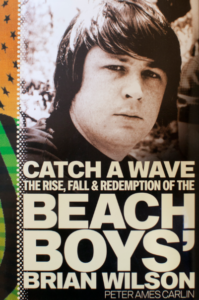 The 17th season of the William B. Crawley Great Lives Lecture Series continues this evening, Feb. 6, with a look at the quintessential American band, The Beach Boys, as well as the artistic genius and downward spiral of its leader, Brian Wilson. Biographer Peter Ames Carlin will talk about his book, Catch a Wave: The Rise, Fall & Redemption of The Beach Boys’ Brian Wilson. This series is open to the public free of charge and no admission tickets are required. Programs begin at 7:30 p.m. in Dodd Auditorium in George Washington Hall. Each lecture concludes with an audience Q&A session with the speaker and a book-signing. The Davenport & Company Lecture.
The 17th season of the William B. Crawley Great Lives Lecture Series continues this evening, Feb. 6, with a look at the quintessential American band, The Beach Boys, as well as the artistic genius and downward spiral of its leader, Brian Wilson. Biographer Peter Ames Carlin will talk about his book, Catch a Wave: The Rise, Fall & Redemption of The Beach Boys’ Brian Wilson. This series is open to the public free of charge and no admission tickets are required. Programs begin at 7:30 p.m. in Dodd Auditorium in George Washington Hall. Each lecture concludes with an audience Q&A session with the speaker and a book-signing. The Davenport & Company Lecture.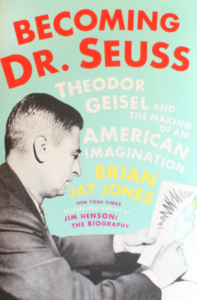 The Great Lives series will continue on Tuesday, Feb. 11, with Becoming Dr. Seuss: Theodor Geisel and the Making of an American Imagination, by Brian Jay Jones, The New York Times bestselling author of Jim Henson: The Biography. The JON Properties/Van Zandt Restorations Lecture.
The Great Lives series will continue on Tuesday, Feb. 11, with Becoming Dr. Seuss: Theodor Geisel and the Making of an American Imagination, by Brian Jay Jones, The New York Times bestselling author of Jim Henson: The Biography. The JON Properties/Van Zandt Restorations Lecture.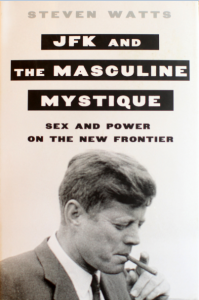 The 17th season of the William B. Crawley Great Lives Lecture Series continues this evening, Jan. 30, with a look at the handsome, young president who was the epitome of masculinity in the early 1960s and the debonair spy who captivated fiction readers and filmgoers, including JFK himself. This series is open to the public free of charge and no admission tickets are required. Programs begin at 7:30 p.m. in Dodd Auditorium in George Washington Hall. Each lecture concludes with an audience Q&A session with the speaker and a book-signing. The John and Linda Coker Lecture.
The 17th season of the William B. Crawley Great Lives Lecture Series continues this evening, Jan. 30, with a look at the handsome, young president who was the epitome of masculinity in the early 1960s and the debonair spy who captivated fiction readers and filmgoers, including JFK himself. This series is open to the public free of charge and no admission tickets are required. Programs begin at 7:30 p.m. in Dodd Auditorium in George Washington Hall. Each lecture concludes with an audience Q&A session with the speaker and a book-signing. The John and Linda Coker Lecture. One of the most widely discussed and controversial events of the Cold War was the downing of the American U-2 spy plane piloted by Francis Gary Powers over the Soviet Union on May 1, 1960. The event was recently depicted in the Steven Spielberg movie Bridge of Spies. Powers was captured by the KGB, subjected to a televised show trial, and imprisoned, all of which created an international incident. Soviet authorities eventually released him in exchange for captured Soviet spy Rudolf Abel. On his return to the United States, Powers was exonerated of any wrongdoing while imprisoned in Russia, yet a cloud of controversy lingered until his untimely death in 1977.
One of the most widely discussed and controversial events of the Cold War was the downing of the American U-2 spy plane piloted by Francis Gary Powers over the Soviet Union on May 1, 1960. The event was recently depicted in the Steven Spielberg movie Bridge of Spies. Powers was captured by the KGB, subjected to a televised show trial, and imprisoned, all of which created an international incident. Soviet authorities eventually released him in exchange for captured Soviet spy Rudolf Abel. On his return to the United States, Powers was exonerated of any wrongdoing while imprisoned in Russia, yet a cloud of controversy lingered until his untimely death in 1977.